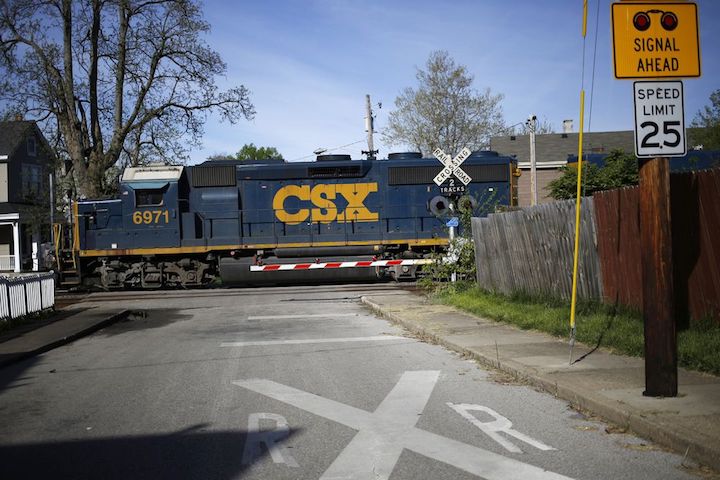CSX Corp. plunged the most since the 2008 financial crisis after a weakened 2019 sales forecast stoked fears of a prolonged freight slump.

“CSX’s volume performance fell off in June and early July and they do not have visibility to improvement in the near term,” Thomas Wadewitz, an analyst with UBS Group AG, said in a note to clients Wednesday. “In addition to weakness in industrial markets, management indicated that excess truckload capacity is a headwind in intermodal.”
“Both global and U.S. economic conditions have been unusual this year, to say the least, and have impacted our volumes,” Foote said late Tuesday after the company reported second-quarter results. “The present economic backdrop is one of the most puzzling I have experienced in my career.”
The shares fell 10% to $71.38 at the close in New York for the biggest drop since October 2008. Union Pacific Corp., which reports earnings on Thursday, also fell sharply, as did Norfolk Southern Corp. and Kansas City Southern. CSX had advanced 28% this year through the close Tuesday, roughly in line with a Standard & Poor’s index of major U.S. railroads.
Second-quarter carloads declined at the major U.S. railroads amid wet weather that interrupted fertilizer carloads and a worsening commercial standoff between the U.S. and China. Shippers moved more freight late last year as President Donald Trump threatened to expand tariffs on Chinese goods. But that’s crimping freight demand this year.
Full-year revenue will decline 1% to 2%, CSX said in a statement late Tuesday. The company had previously predicted slight growth.
A June 21 explosion at a Philadelphia refinery will shave 1% from volume on an annual basis, and other industrial customers have shown signs of weakness, Foote said.
CSX’s operating ratio, a measure of efficiency in which a lower number is better, improved in the second quarter to 57.4% from 58.6% a year earlier amid cost cuts. The railroad maintained its 2019 target of less than 60%, even as carloads fell.
Intermodal freight, which is mostly consumer goods carried in ocean-going containers that can also be put on a truck or train, fell 10% as CSX eliminated lower-profit routes. The Jacksonville, Florida-based company said it has reduced routes for shipping containerized freight by 15% since September.
What Bloomberg Intelligence Says
CSX painted a less-optimistic outlook for second half than that communicated by Canadian Pacific and J.B. Hunt. Volume expectations were reeled in following increased truck competition’s impact on intermodal, the Philadelphia Energy Solutions (PES) refinery fire in June, softer coal demand and moderating economic activity.—Lee Klaskow, transportation analystClick here to view the research
Foote said there could be upside to the railroad’s forecast if conditions improve in the second half of the year.
“I remain encouraged by the performance of our core merchandise franchise during a softer-than-expected freight environment,” he said.
Precision Railroading
CSX’s success with Precision Scheduled Railroading, a technique deployed in 2017 by legendary railroader Hunter Harrison, has compelled all major U.S. rails except BNSF Railway Co. to adopt the strategy. Foote, who Harrison handpicked as CEO only weeks before his death in December 2017, has helped take CSX to first from last place in efficiency among major U.S. railroads.
Adjusted earnings rose to $1.08 a share in the second quarter, CSX said. That trailed the average $1.11 average of analyst estimates compiled by Bloomberg. Sales fell about 1% to $3.06 billion, below the lowest analyst estimate.
Now that CSX is done with restructuring its network and has replaced all top management since 2016, the focus will be on improving rail car delivery times enough to take more cargo from trucks, Foote said. CSX will begin sharing its on-time record with customers to win more business, he said.
“There are billions of dollars of freight that move in a truck that should go in a rail car,” Foote said in an interview. “The reason they don’t go in a rail car is because rail has historically been unreliable from a service delivery standpoint.”







